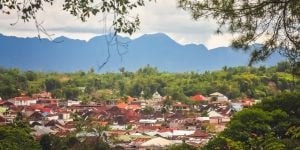Australian owning Property in Bali
Subscribe to the topic
Post new topic
Yes, and that contract is best when it's written by an attorney!
Thanks all for you replies.
I have asked notarist to retain the amount needed for transfer tax and pay this from the funds obtained from purchase.
If he can do that I will know its paid and he can pass on a copy of receipt.
I can only ask !!!!
"ubudian" can I ask what other things beside tax issue you are referring to.
I think I have it covered, but would appreciate your input.
Sandy
There are a number of specific legal land lease agreements here in Indonesia and they are primarily based on what the use of the land will be
commercial, single family residential, farming, etc.
Any lawyer (or notaris) worth his or her salt will first consult the zoning restriction in place on the original title deed (Hak Milik) to be sure that whatever your plans for use of this land are allowed. In other words, a lease agreement made subsequent to the issuance of the title deed cannot circumvent or override the original zoning and allowed land use as stipulated in the Hak Milik or any subsequent lease agreements prior to your lease agreement.
Another consideration (and often over looked here) is the wording of the original lease agreement as it ties into the original Hak Milik. These considerations can, (and often do) involve other names than those names as issued in the original land deed (Hak Milik).
For example, the Hak Milik is issued to I Made Singa but hes now dead and his first born son, Wayan currently owns the land you are leasing from another leasor. The first lease was agreed and signed onto by Made, but Wayans agreement is absent.
Adding to all this potential confusion is the fact that these regulations can vary (or at least their implementation can vary) between the various regencies of Bali. That is why I specifically suggest you consult an attorney who is located in Bandung Regency as he or she will be well aware of these subtleties.
Take my word for it as Ive been buying and selling and leasing land in Bali with my Balinese family for over 15 years and Ive seen just about every imaginable twilight zone of potential horror you can think of. It happens here with all too much frequency
the bule (meaning you) finding him or herself between a rock and a hard place because they didnt do what any other Balinese would do in the same situation.
Due diligence has a special meaning here in Bali
and it cannot be over exaggerated to use due diligence before handing over the kind of money youll be handing over by taking on already existing 20 year lease in Seminyak.
Thanks for taking time to help.....
I have now contacted notarist to request a copy of original document of lease...as I will be the second lease holder from original doc.
I will check to see if the owner name is still the same , and either way, have that name recorded on my contract.
If there is a different owner to original, I will make sure this is noted and new owner to sign my doc.
Thanks again for your help...steep learning curve.
Sandy
helo! different necessary is different answer.understand the topic&situation for leasing& se lling-buying land is verry good.[Moderated: No free ad pl]
best regard,
Bali-Jakarta
Hi
About to make an offer on a leasehold 15 yrs + 20 on offer!
1. Can anyone recommend a reputable Indonesian lawyer - the property is in Tanah Lot?
2. Do I still need an Indonesian nomanee for a leashold arrangement?
Looking forward to your suggestions - K
Yes, I can highly recommend Peter Johnson who founded Austrindo some 12 years ago specifically to assist foreign clients with land related issues. Peter, btw, is an Australian attorney so you should feel very comfortable with him.
http://www.austrindo.com/
No, you do not need an Indonesian nominee for a leasehold agreement.
Good luck!
I am a local balinese.
Really?
Then why in your profile do you write,
I am Australian, and I am now living in Indonesia.
Can we cut the BS please?
ignmmulia wrote:hi matt, I can help you to own villa in bali.
What - you can change Indonesian law? WOW.
According to him Fred, hes Balinese (a tycoon) and he might even think he could push Gunung Agung all the way to Gilimanuk! Oh wait, maybe hes Australian or Hungarian, and can only push Gunung Agung ten meters!
Hi, I'm really interested in living in Bali for 6 months of the year but not sure where the best place to look for properties to lease is also whether its possible to work whilst I'm there. Any advice would be super
Kimmac wrote:Hi, I'm really interested in living in Bali for 6 months of the year but not sure where the best place to look for properties to lease is also whether its possible to work whilst I'm there. Any advice would be super
Agreements tend to be for a year but you may well find something with six months.
You can't work without a working permit or you may find yourself in a free hotel for up to six years.
Most working permits, and the KITAS to go with them, are for twelve months.
Hey Debby
what a great demonstration of spam on steroids! 
Hi Matt ,
How did you go in finding out all the data you needed to purchase a place in Bali?
So much to read and take on .
Was it really that hard?
If it was a smooth transition pls explain the basic step s and measures you had taken .
All the best
Hi, yes always reading and learning about Bali. The main thing is we can't legally own properties in our name, yes you will be told there are ways with nominees or companies but at the end of the day it's not personally you. The safest way I can find is by a long term lease in your name so no you won't after the property after the term. Usually the term ranges upto 25 or 30 years depending on the lease. The amount of the lease needs to be paid up front for the full term of the lease. Always use a good solicitor from Bali to read over the conditions of your lease and make sure all is covered.
Good luck with your search and I'd love to hear your story as well.
Matt
P.s there are many nice people on this site who will assist you with their knowledge as well
The safest way I can find is by a long term lease in your name so no you won't after the property after the term. Usually the term ranges upto 25 or 30 years depending on the lease.
This is absolutely true and it's the the only legal manner for foreigners to enjoy the long term benefits of a home in Bali unless the foreigner is also establishing a PMA business.
The courts will NOT support a foreigner who has a legal issue regarding property when said property has been secured using an Indonesian nominee but will support a foreigner who uses the proper legal format, aka Hak Pakai and Hak Sewa, the right of use and the right of lease. Such legal arrangements are written for an initial 25 year period and extendable for another 25 years but note
these are indented only for foreigners domiciled in Indonesia.
Hi everyone. Thanks for the valuable information posted on this forum, especially from Ubudian.
We are ex-pats wanting to set up a business in Bali and were considering using a Balinese friend as a nominee but have decided against this idea in light of the risks. We are now thinking of setting up a PMA but want to make sure we understand it correctly. If the company purchases the land, the company can't own the freehold title but can own a HGB title, meaning that essentially the land office will own the land but we will have the right to build on it and use it for 30 years. So the company won't get any capital gains on the land at all, is that correct? Since the land office will hold the freehold title, does this mean they will own any buildings we put on it over the next 30 years too at the end of the lease like Hak Pakai? It seems as though setting up a PMA is far more onerous than Hak Pakai (which we understand to be simply leasing the land from a Hak Milik owner). Setting up a PMA appears to be a lot of extra paper work initially, bi-annual reporting, more tax, expensive to set up ~35M IDR etc, so are there any advantages of setting up a PMA over leasing the land from an Indonesian over 25 yrs? To get a PMA company approved, is it true that it needs to have a value of over 10 billion IDR (over AUD$1M) and we need at least 1/3 of the capital? Thanks in advance for your answers.
Cheers
are there any advantages of setting up a PMA over leasing the land from an Indonesian over 25 yrs?
No advantage whatsoever.
To get a PMA company approved, is it true that it needs to have a value of over 10 billion IDR (over AUD$10M) and we need at least 1/3 of the capital?
Yes, 10 billion IDR but thats 1 million AUD, not 10 million and the minimum paid up capital investment is 25% with a minimum of $300,000.
Establishing a PMA for the sole purpose of acquiring land to build a home on is not only illegal, but it makes no sense whatsoever. Moreover, while some PMA companies can be 100% foreign owned, many (if not most) require a minimum 5% Indonesian partnership.
Anyone thinking about a PMA must absolutely consult and engage an attorney. Do not even think about simply relying on a notaris.
Thanks Ubudian for your reply. So if there aren't any advantages why would people bother going to all the extra effort setting up a PMA to build & run villas rather than just leasing the land? Do the buildings belong to the land office once the 30yr period is up and can you get captial gain from the land the PMA purchases? One benefit of having a PMA company is the ability for us to obtain Kitas visas allowing us to work. I don't think you can legally work with Hak Pakai can you?
Thanks for confirming the 10B IDR figure, that's what we thought. Do you know if this is the initial setup cost or the predicted company value once operational?
Thanks again Ubudian.
Building villas as a commercial venture is whole other matter and I wasnt addressing that in my prior comments. If your objective is to buy land for commercial villa development then you may have no alternative than to set up a PMA and you surely will need a local partner as well
not to mention a really good lawyer.
Unless the rules have recently changed (again) a PT company can sponsor KITAS and working permits for up to two foreigners, so your original idea of working with a Balinese partner (a trustworthy one) might be more viable. It somewhat depends on how much of an investment/how big an operation you are considering.
If youre planning a large scale operation then your partner or partners should include the regency head (Bupati) where you are going to build otherwise you will run into all sort of snags at the regency level. The simple fact is some regencies in Bali are easier to work with than other regencies and there is often little consistency in the way the details are handled from one regency to another.
You will also need all the proper licenses, registrations, land zoning certificates, water and electric considerations and most of all
the blessing of the Kepala Desa (head of the village) where you plan your project. Hiring workers for your project when being built as well as after its done from the local village (your project location) goes a long way to establishing harmony and a warm welcome.
My advice
take this very slowly, very carefully and consult a good attorney. I could take you around to several half built projects that have been sitting dormant for years because of all the potential pitfalls and snags that werent adequately considered and taken care of before building began. Funny thing about the Balinese
they often wait until a project is near completion before telling you the bad news.
Good luck.
Thanks again for all of your advice Ubudian. We are only thinking of a small operation and would be well under the AUD$1M mark, so I don't think we'll qualify as a PMA company unfortunately. It was my understanding that PMA company doesn't "own" the land anyway, isn't it relinquished to the land office as state land? The nominee arrangement sounds too risky for us at this stage of our journey so that appears to leave us with no other option than Hak Pakai. Just one more question, do you know how the lease fee for Hak Pakai is worked out? Is this a random figure devised by the land owner which is up for negotiation or is it based on a percentage of the land value? Can it potentially be more than the land is worth?
Thanks again, you're been very helpful! Have a great night.
Your comments about not really owning property when it is purchased by a PMA are not something Ive heard before, and I am somewhat doubtful that what youve heard is completely correct, but who knows. Nothing surprises me anymore.
Being married to a Balinese, our own businesses have never been on a PMA basis, (zero need), so I am not qualified to answer your specific questions relating to property ownership under a PMA. Those are questions you are best running by a good attorney, and please do not rely as gospel most anything you read on forums relating to such specific situations.
Im very happy to recommend an excellent attorney here in Bali, who also happens to be an Australian, namely, Peter Johnson. He has been around almost as long as I have, and while I havent personally engaged his services, I have heard very good reports from others who have relied on his expertise and professionalism. His web site:
austrindo.com/
I appreciate your expressed thanks.
For me, this is simply payback, or call it karma for all the good advice I got from other expats already living on Bali before I made the big move long ago.
By and large the expat community on Bali is a helpful, or at least they used to be in days gone by.
Considering your plans you might also consider joining Inter Nations. That is a pretty good site for networking with other expats located here in Bali.
I will not recommend the old Bali Expat Forum which these days is called Balipod.com as that forum is ripe with endless baloney and the information provided there is totally unreliable. Too many regular contributors there have their own personal agenda, and all I can say is hati, hati
beware.
Cheers, and good luck.
Just like to "pass" on the below information I found in regard to property ownership in Indonesia as may be helpful to some. Note the statement, "Irrevocable Powers of Attorney MAY NOT be granted in respect of transactions involving landed property"
Notes from a small planet.
Buying freehold land on Bali
May 3, 2013 by The Last Picasso,
Expats Beware
The following is taken from articles by Bali Discovery and The West Australian, and gives good advice for non-Indonesians wishing, or even thinking they can acquire freehold land on Bali or any other Indonesian territory.
The West Australian Newspaper has carried an article quoting the director of the Bali-based Saville Rowe Property Group describing how freehold ownership is increasingly popular among Australians investing in real estate on Bali, as opposed to those merely leasing land and property on the island.
Quoting Jason Vershaw of the Saville Rowe Property Group, the property broker readily admits Indonesian law specifically prohibits foreign ownership, but then describes how to get around the law by using renewable leases and nominee Indonesian landowners.
The article quotes Vershaw who describes the nominee process, saying, The local persons name is put on the deed and they are paid a gratuity for that service. But there are protections for the foreigner, as the local does not have the power to sell the property without the foreign owners permission, and there are many documents and witnesses to protect the foreigner.
Unfortunately, Vershaw and his group are not alone in dispensing this sort of questionable legal advice to foreigners eager to own their piece of paradise, contributing along the way to Balis current over-blown property market.
Admitting that people had been burnt on Bali in the past, Vershaw offers the assurance that reputable agents, abiding by a code of ethics, now help expats buy safely.
While we do not know Vershaw, his property group, or that groups reputation for ethical business practice, we do believe that anyone suggesting ethical behaviour is involved in a transaction that offers to sell freehold property to
foreigners on Bali is, at best, playing loosely with both ethics and the law as it is currently written in Indonesia.
Offers to transfer freehold title to a foreigner in Indonesia are patently untrue and do not synchronize either the letter or spirit of the law as now written. Such transactions also ignore very real potential pitfalls ahead for foreigners seeking to own land in Indonesia.
Consider the following:
It is strictly against the law for foreigners to freely hold or enjoy the possession of land for an indefinite period in Indonesia. Past efforts to change the law to permit foreign freehold ownership have been repeatedly rebuffed by the Indonesian Constitutional Court. It is a generally accepted and a universal point of law that legal constructions put in place to purposely get around the law, when detected by a countrys judicial system, are sufficient grounds to allow such contracts to be summarily declared null and void by the courts.
The legal validity of Irrevocable Powers of Attorney frequently used in nominee property deals in Bali remains highly problematic. Not only do questions arise whether any such grant of power survive the issuing party, but such documents directly contradict Indonesian law that does not recognize the beneficial ownership of landed property. Moreover, a Ministerial Decree issued in 1982 specifically states that Irrevocable Powers of Attorney MAY NOT be granted in respect of transactions involving landed property.
In short, Irrevocable Powers of Attorney do not exist in Indonesian property transactions and the very presence of such a document as part of a property transaction means such a document could be used against a foreign investor as proof of his/her blatant attempt to circumvent higher Indonesian law, including The Basic Agrarian Law and the Indonesian Constitution.
Also needing further clarification is the legality of fictional mortgage agreements typically signed with nominees as a means to further secure a foreign freehold on Bali. Questions arise as to whether such loan agreements between Indonesians and foreign legal entities require advance approval of the Indonesian government, and because such loans are fictive, whether the loans could withstand legal scrutiny if the mortgager subsequently decided to repudiate the original mortgage agreement.
As Indonesia judicial and tax authorities in their fight against corruption are increasingly resorting to money laundering indictments that require taxpayers to demonstrate the source of the funds used to acquire expensive assets, those using nominee arrangements must consider the implications these trends might have on name lenders and the assets held by nominees.
Foreigners living or working in Indonesia would do well to obey the laws of their adoptive home. Those holding Indonesian law in contempt by looking for loopholes and ways to bend the rules to their own devices are involved in a dangerous game with costly consequences in the long-term.
It must also be borne in mind that those viewing the law as a manipulative plaything, will find themselves in a most hypocritical and sadly ironic position when they attempt to seek shelter and protection under the very same legal system that they have tried to subvert in the past.
It is our steadfast contention that the term freehold when used in local real estate promotion to foreign customers, should be seen as prima facie indications of unethical intent. The Indonesian term for freehold is hak milik and the Indonesian term should be the only term allowed and then limited in its use only with Indonesians within the context of Indonesian land transactions.
In the end, freehold land ownership remains the exclusive domain of Indonesian nationals. Anyone using the term freehold in the Indonesian context, and particularly when dealing with foreign nationals, needs to be
earnestly asked if he genuinely knows what hes talking about?
If you are a foreigner thinking of buying freehold land in Indonesia, do your homework well!
Ken
"If you are a foreigner thinking of buying freehold land in Indonesia, do your homework well!"
There is no homework to be done, as the idea of freehold for foreigners is simply impossible!
For some strange reason this concept seems to go over the heads of all too many saps that end up totally screwed by illegal and criminal real estate agents operating in Bali.
The "halls" of "Hotel Kerobokan" (our prison) is starting to fill up with these parasites, but there are more whose turn to check in their baggage awaits.
Ken Makassar wrote:Just like to "pass" on the below information I found in regard to property ownership in Indonesia as may be helpful to some. Note the statement, "Irrevocable Powers of Attorney MAY NOT be granted in respect of transactions involving landed property"
Notes from a small planet.
Buying freehold land on Bali
May 3, 2013 by The Last Picasso,
Expats Beware
The following is taken from articles by Bali Discovery and The West Australian, and gives good advice for non-Indonesians wishing, or even thinking they can acquire freehold land on Bali or any other Indonesian territory.
The West Australian Newspaper has carried an article quoting the director of the Bali-based Saville Rowe Property Group describing how freehold ownership is increasingly popular among Australians investing in real estate on Bali, as opposed to those merely leasing land and property on the island.
Quoting Jason Vershaw of the Saville Rowe Property Group, the property broker readily admits Indonesian law specifically prohibits foreign ownership, but then describes how to get around the law by using renewable leases and nominee Indonesian landowners.
The article quotes Vershaw who describes the nominee process, saying, The local persons name is put on the deed and they are paid a gratuity for that service. But there are protections for the foreigner, as the local does not have the power to sell the property without the foreign owners permission, and there are many documents and witnesses to protect the foreigner.
Unfortunately, Vershaw and his group are not alone in dispensing this sort of questionable legal advice to foreigners eager to own their piece of paradise, contributing along the way to Balis current over-blown property market.
Admitting that people had been burnt on Bali in the past, Vershaw offers the assurance that reputable agents, abiding by a code of ethics, now help expats buy safely.
While we do not know Vershaw, his property group, or that groups reputation for ethical business practice, we do believe that anyone suggesting ethical behaviour is involved in a transaction that offers to sell freehold property to
foreigners on Bali is, at best, playing loosely with both ethics and the law as it is currently written in Indonesia.
Offers to transfer freehold title to a foreigner in Indonesia are patently untrue and do not synchronize either the letter or spirit of the law as now written. Such transactions also ignore very real potential pitfalls ahead for foreigners seeking to own land in Indonesia.
Consider the following:
It is strictly against the law for foreigners to freely hold or enjoy the possession of land for an indefinite period in Indonesia. Past efforts to change the law to permit foreign freehold ownership have been repeatedly rebuffed by the Indonesian Constitutional Court. It is a generally accepted and a universal point of law that legal constructions put in place to purposely get around the law, when detected by a countrys judicial system, are sufficient grounds to allow such contracts to be summarily declared null and void by the courts.
The legal validity of Irrevocable Powers of Attorney frequently used in nominee property deals in Bali remains highly problematic. Not only do questions arise whether any such grant of power survive the issuing party, but such documents directly contradict Indonesian law that does not recognize the beneficial ownership of landed property. Moreover, a Ministerial Decree issued in 1982 specifically states that Irrevocable Powers of Attorney MAY NOT be granted in respect of transactions involving landed property.
In short, Irrevocable Powers of Attorney do not exist in Indonesian property transactions and the very presence of such a document as part of a property transaction means such a document could be used against a foreign investor as proof of his/her blatant attempt to circumvent higher Indonesian law, including The Basic Agrarian Law and the Indonesian Constitution.
Also needing further clarification is the legality of fictional mortgage agreements typically signed with nominees as a means to further secure a foreign freehold on Bali. Questions arise as to whether such loan agreements between Indonesians and foreign legal entities require advance approval of the Indonesian government, and because such loans are fictive, whether the loans could withstand legal scrutiny if the mortgager subsequently decided to repudiate the original mortgage agreement.
As Indonesia judicial and tax authorities in their fight against corruption are increasingly resorting to money laundering indictments that require taxpayers to demonstrate the source of the funds used to acquire expensive assets, those using nominee arrangements must consider the implications these trends might have on name lenders and the assets held by nominees.
Foreigners living or working in Indonesia would do well to obey the laws of their adoptive home. Those holding Indonesian law in contempt by looking for loopholes and ways to bend the rules to their own devices are involved in a dangerous game with costly consequences in the long-term.
It must also be borne in mind that those viewing the law as a manipulative plaything, will find themselves in a most hypocritical and sadly ironic position when they attempt to seek shelter and protection under the very same legal system that they have tried to subvert in the past.
It is our steadfast contention that the term freehold when used in local real estate promotion to foreign customers, should be seen as prima facie indications of unethical intent. The Indonesian term for freehold is hak milik and the Indonesian term should be the only term allowed and then limited in its use only with Indonesians within the context of Indonesian land transactions.
In the end, freehold land ownership remains the exclusive domain of Indonesian nationals. Anyone using the term freehold in the Indonesian context, and particularly when dealing with foreign nationals, needs to be
earnestly asked if he genuinely knows what hes talking about?
If you are a foreigner thinking of buying freehold land in Indonesia, do your homework well!
Ken
Ken, kudos to you mate. Thats one of the best put together pieces of advice to starry eyed seekers of nirvana I have come across in ages.
It is hard to believe that people who are considered hard headed businessmen/women in their own countries are so easily (and in certain cases some might allege criminally) mislead but fellow expatriates.
Why are the prospective buyers of "freehold" land in Bali so trusting towards another "white face"? So many of the horror stories around concern expatriates ripping off fellow countrymen. But the main ones we hear about are the Indonesian/Balinese nominees.
All you expats out there considering investing in Bali and using other expatriates who live in Bali as advisors, GOOGLE the people whose advice you will be using to invest your hard earned shekels!!!
If all you get are good vibes, then proceed (with due caution). If you get bad vibes, find out why. It's your money at stake.
Joji
Beware, This Is Indonesia
He said They said.We already agreed Not worth a cracker !!
Beware, Its not like Australia
[moderated: no free ads please]
Om swastiastu Nyoman.
The reason why your post was moderated into oblivion is because it was indeed a blatant advertisement.
Two tips from me:
One is to NEVER make a post which is written in poor English and barely understandable. If you are unable to handle English in a proper manner, then find someone who can and get the translation from them.
Do you honestly think that tamu are going to be comfortable dealing with a local who cant even handle basic English when dealing with high expense issues like property?
Point two is to present yourself on forums new to you in a helpful and non solicitous manner.
The internet is a great place to market yourself and your products, but there are some basics to understand before you abuse the privilege of discussion by advertising.
an irrevocable power of attorney as so often used in nominee arrangements is not recognised for real estate purposes under Indonesian law.
Now that must be a worry to many.
Now that must be a worry to many.
Yes, and no. In reality quite a number of nominee schemes have been in place on Bali for quite some time and without a hitch. It can work, but it is a big gamble.
When problems arise down the road the reason is almost always because of the death or incapacitation of the nominee. On rare occasions the nominee can have a change of heart, and the greed factor kicks in as the nominee comes to realize the great value of the land over time. The Balinese are as human as anyone, and they surely dont hold any monopolies on morality or fairness. Another potential pitfall is when the nominee uses the Hak Milik in his (or her name) as collateral on a loan, and later on is unable to pay said loan.
In days now long gone, the nominee scheme used to be the most common way for a foreigner to contract land when the current owner was unwilling to lease it themselves
rather looking for an outright sale. These days reflect an attitude change amongst a great many Balinese land owners who understand that leasing long term has great advantages to them
or more to point, to their family in future years.
humm.....i have crazy idea about expat that would like to owning property here. And it's legally but the things must you have is trust and logic.
but, it's nice discussion
keep continued guys 
Hak Pakai or right of use is the normally the best way for a foreigner to secure land if they reside in Indonesia and are not married to an Indonesian national.
IMHO this contract should only be drawn up by an attorney based in the particular regency where the land is located. A notaris comes into play only after the contract is drawn up to the satisfaction of the client.
As an extra precaution, especially in more remote areas, it is also very advisable that the Kepala Desa (village head) is in the loop and aware of such contracts undertaken by foreigners within the village to assure that the contract is within the parameters of the Banjar Adat.
No, a foreigner cannot own land freehold in Indonesia. There is no legal way around that law, and it's highly unlikely that foreign ownership of Indonesian land will be possible in the foreseeable future.
In a nut shell...Indonesia, tidak di jual. Indonesia is not for sale.
Depending on who you want to believe there seems to be consensus that leasehold of real estate is for a maximum of 30 years to a foreigner with up to 2 rights of renewal for 20 years meaning a possible maximum of 70. Why then are so many leases being offered for 32 years? Perhaps it is because, should there be any problems (e.g. the developers do not complete the project) that the lease could be considered void on the basis the term of the contract exceeded the allowable maximum. Caveat emptor.
So ubudian.1 time us possible and 1 time it isn't.
I don't understand.
Hak milik impossible for foreigner but hak pakai is possible.
I don't know why every agent never mentionned that hak pakai is a good way for foreigner.
Sorry Karim, but I dont understand your confusion. Foreigners have never been allowed to own land in post independence Indonesia. A Hak Milik is a land deed (freehold ownership) and Hak Pakai is a right of use long term lease.
I don't know why every agent never mentioned that hak pakai is a good way for foreigner.
You might be surprised just how many agents there are running around Bali who have little understanding and appreciation for the law.
If you are considering investing in property here, then hire a good local attorney.
There is a famous old American saying coined by Benjamin Franklin that is very appropriate here..."penny wise, pound foolish."
Articles to help you in your expat project in Bali
 Accommodation in Bali
Accommodation in BaliIf you are planning to relocate to Bali, housing is a critical part of your project. So how to find your ...
 Buying property in Bali
Buying property in BaliShould your experience as an expatriate in Bali make you want to settle down permanently, you might want ...
 Popular neighbourhoods in Bali
Popular neighbourhoods in BaliBali is regarded as one of Indonesia's smallest islands with a large population but is home to ...
 Renting, my experience
Renting, my experienceI have been renting an apartment for the past 9 months and the contract is due for renewal in March. ...
 Accommodation in Indonesia
Accommodation in IndonesiaMany of the expatriates living in Indonesia prefer renting accommodation owing to the generally limited ...
 Working in Bali
Working in BaliThe multi-faceted island of Bali offers many opportunities for those who wish to move from tourist to ...
 Studying in Bali
Studying in BaliEven if Bali is renowned as a major tourist destination, the island is by no means limited to its idyllic ...
 Making friends in Bali
Making friends in BaliBeing an expat in Indonesia can be a daunting experience. Everything from the language barrier and the culture ...
Find more topics on the Bali forum



